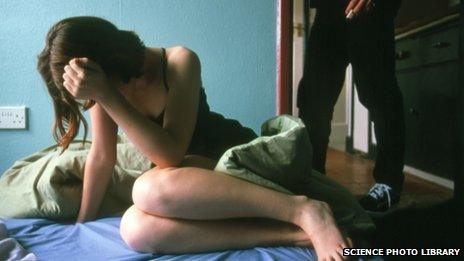Psychological abuse 'should be a made crime'
- Published

Psychological control is the essence of domestic abuse, campaigners say
Psychological abuse should be made a crime in England and Wales in order to save more victims of domestic violence, campaigners have said.
The groups, including Women's Aid, say current legislation focuses too much on specific incidents, such as an assault.
They say the law fails to take into account power and control, which are the essence of domestic abuse.
The Home Office said it would carefully consider the idea after a police review of domestic abuse was completed.
Women's Aid, the Sara Charlton Charitable Foundation and stalking advice service Paladin have urged the government to criminalise "coercive control", patterns of abusive behaviour and causing psychological harm, in order to make it easier to prove long-running abuse.
Excessive jealousy
Coercive control, which can include being excessively jealous, stopping someone from seeing family and friends or controlling what a victim wears, was included in the Home Office definition of domestic violence last year, but is not currently a criminal offence.
The groups carried out an online survey of 258 abuse victims between December 2013 and last month and found that 88% of them did not think the criminal justice system took psychological harm into account.
In addition, 94% of the respondents said mental cruelty could be worse than physical violence.
The chief executive of Women's Aid, Polly Neate, said: "These survey results clearly reflect what our member services have been telling us for a long time - that the criminal justice focus on individual incidents of physical violence cannot reflect the ongoing psychological harm caused by coercive control in intimate relationships.
"Currently two women a week die at the hands of a partner or ex-partner; the next step to preventing these deaths is reform to allow the criminal justice system to take account of patterns of controlling and violent behaviour."
- Published5 March 2014
- Published26 February 2014